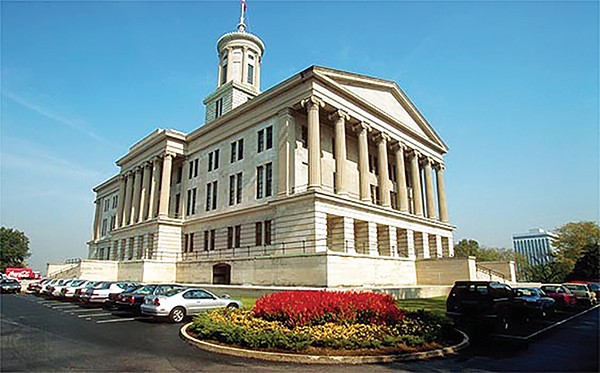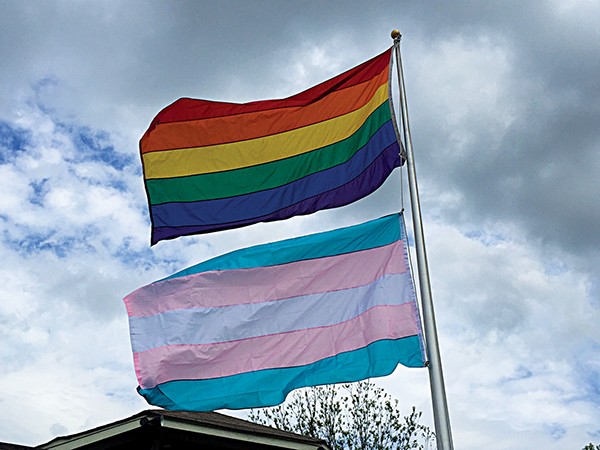
State Capitol building
A bill that discriminates against the LGBTQ+ community and one “that we don’t really need in this state,” according to its sponsor, passed overwhelmingly in the state Senate Tuesday.
In its first major act of business this year, the state Senate voted Tuesday to allow some private adoption agencies to discriminate against gay couples. The bill was yanked from a Senate floor vote at the end of last year’s legislative session. It had already been approved in the House. Senators approved the bill Tuesday in a 20-6 vote.
The bill is broad, though, and would allow those agencies to discriminate against any group, as long the group has stated their objection to them in writing. The bill would shelter faith-based adoption agencies from lawsuits by any group claiming discrimination. It prohibits faith-based groups from participating “in any child placement for foster care or adoption that would violate the agency’s written religious or moral convictions.”
 Tennessee General Assembly
Tennessee General Assembly
Rep. Tim Rudd
The bill’s House sponsor, Rep. Tim Rudd (R-Murfreesboro), said last year he brought the bill after reading newsletters from National Right to Life and the Heritage Foundation. Adoption agencies, especially by Catholic Charities, were forced out of business after facing discrimination lawsuits, suits Rudd said can cost hundreds or even millions of dollars.
At the end of the first part of the 111th General Assembly last year, many Senators questioned the need for such a specific bill. Many — including House Speaker Randy McNally — brought the question again on the Senate floor Monday.
“I don’t think (the bill is necessary) and the protections already exist,” McNally said.
Those protections exist, some Republican Senators said Tuesday, in 2009’s Tennessee Religious Freedom Restoration Act (RFRA).
 Tennessee General Assembly
Tennessee General Assembly
Lt. Gov. Randy McNally
“The language in this bill seems duplicative in many ways,” said Sen. Jon Lundberg (R-Brsitol). “The legislature has done a solid job over the last decade of protecting religious freedoms. I think we’re covered.”
Sen. Paul Rose (R-Tipton and part of Shelby County), the bill’s sponsor, said early in Tuesday’s debate that his bill “codifies what we already do” and that “we don’t really need this bill in the state” because of RFRA.
However, he also said the bill was a proactive move to prevent the closure of adoption agencies, as has happened in Pennsylvania, New York, California, Massachusetts, and the District of Columbia. Eight other states, like Virginia and Alabama, have passed similar legislation to the one he carried.  Tennessee General Assembly
Tennessee General Assembly
Sen. Steven Dickerson
In a fiery exchange, Sen. Steve Dickerson (D-Nashville), asked Rose what kinds of people could these agencies deny a child in their care. He said any combination outside of the traditional, married mother-and-father structure he said, “anything outside of that, whatever that is. It’s called freedom.”
Pressed further by Dickerson, Rose said that the legislation — though, he was not a lawyer — would allow, say, an Episcopalian group to deny adoption to a Muslim family and vice versa. “It is my understanding that this bill would allow it,” Rose said.
 Tennessee General Assembly
Tennessee General Assembly
Sen. Jeff Yarbro
Early in the debate, Sen. Jeff Yarbro (D-Davidson County) proposed an amendment to the bill that excluded any agency from these protections if they had state contracts, took state grant funding, or took any kind of public money.
When these firms take government money, “they are no longer acting as a private actor, they are public actors using public dollars, for public functions,” Yarbro said.
Rose called the amendment “insidious” and “hostile” and “totally wipes out the intent of this bill.” The amendment was defeated on voice vote.
Sen. Raumesh Akbari, the only female and African American to speak during the debate, said a friend of hers grew up in the foster case system and was “exposed to sexual violence and physical abuse.” The friend later grew up to be in a same-sex relationship and she and her partner have adopted two children “in a very loving home.” Putting children in a loving home, Akbari said, “puts them on the correct path and changes the trajectory of their life.”  Tennessee General Assembly
Tennessee General Assembly
Sen. Raumesh Akbari
“What is best for children?” Akbari asked. “For me, this boils down to children being safe and happy and for them to be free from abuse and to feel like they belong.”
Dickerson said the bill could have significant financial impacts here.
“In the last six months, a number of conventions have inquired about this bill and said if passed they would not book future conventions in our state,” Dickerson said.
He said the bill would put the state out of the running for future events by the NFL, NHL, and NCAA. Other businesses, too, would “be less likely to relocate and open here as a direct result of this bill.”
 Tennessee General Assembly
Tennessee General Assembly
Sen. Paul Rose
However, Rose told Senators the bill “was about the right to choose.”
“If you believe in freedom, you’ll put aside the issues thrown at you from the business community and look to the roots of this nation,” Rose said.
The bill passed, with four Republicans, including McNally, voting present but not voting.
The bill now heads to Gov. Bill Lee’s desk for approval.
REPSONSES:
Before the floor vote Monday, groups were calling for the bill’s defeat.
 Bianca Phillips
Bianca Phillips
Flags fly over OUTMemphis.
Currey Cook, counsel and director of the Youth in Out-of-Home Care Project for Lambda Legal, said the bill “would deny children in foster care in Tennessee a much-needed family simply because agencies want to put their beliefs above the best of interests of the children.”
“Tennessee risks joining the roster of states who have passed similarly harmful bills that allow government-funded discrimination and we urge state senators of conscience to resist this effort that sends a message to LGBTQ families that they are not welcome,” Cook said in a statement. “To deny qualified parents eager to foster or adopt children in need of loving homes because of their sexual orientation or gender-identity or particular religious belief – criteria wholly unrelated to their ability to parent – is not only wrong, but turns the entire child welfare system on its head by prioritizing a provider’s interests over those of children.”
Hedy Weinberg, executive director of the ACLU of Tennessee said: ”Turning away good families, as (the bill) would allow, simply because they don’t satisfy an agency’s religious preferences would deny thousands of Tennessee children access to the families they urgently want and need.”